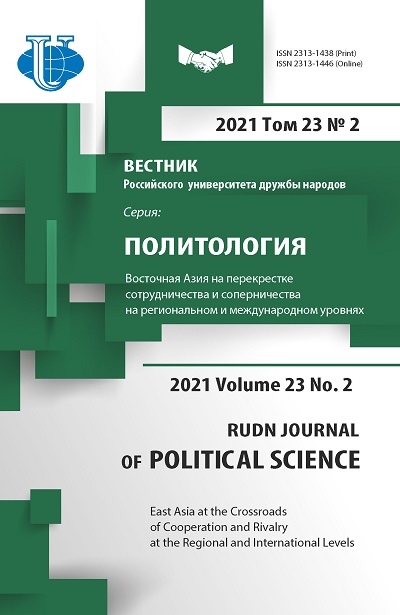Historical Policy of the Roh Moo-hyun’s Government in South Korea: Seeking Reconciliation with the Past
- Authors: Kim N.N.1,2
-
Affiliations:
- Institute of Oriental Studies RAS
- National Research University Higher School of Economics
- Issue: Vol 23, No 2 (2021): East Asia at the Crossroads of Cooperation and Rivalry at the Regional and International Levels
- Pages: 305-315
- Section: SOCIO-CULTURAL DEVELOPMENT OF KOREA
- URL: https://journals.rudn.ru/political-science/article/view/26548
- DOI: https://doi.org/10.22363/2313-1438-2021-23-2-305-315
Cite item
Full Text
Abstract
Historical policy was one of the main directions of the domestic policy of the Roh Moo-hyun’s government (2003-2008). The ideological justification of revising the 20th century history of Korea was the idea of building a new Korean society based on the principles of democracy and the rule of civil rights and freedoms. Through the implementation of a new historical policy the Roh Moo-hyun’s government tried to prove that the creation of such a society was impossible without revealing the truth about the historical past, in which the state repeatedly neglected civil rights and committed crimes. Increased attention to issues of restoration of the historical justice is typical for the current government of Moon Jae-in, the political successor of Roh Moo-hyun. Based on the analysis of the governmental documents, legislation this paper reveals the main disagreements between political parties of the Republic of Korea around the establishment of the Truth and Reconciliation Commission, identifies the key results of its activities.
About the authors
Natalya N. Kim
Institute of Oriental Studies RAS; National Research University Higher School of Economics
Author for correspondence.
Email: nkim@hse.ru
ORCID iD: 0000-0001-7728-7968
PhD in History, Associate Professor at the School of Asian Studies, National Research University Higher School of Economics, Research Fellow at the Institute of Oriental Studies, Russian Academy of Science
Moscow, Russian FederationReferences
- Asmolov, K.V. (2019). Korean political culture: traditions and transformation. Moscow.
- Bae, S. (2021). Han nun-ae bo-neun “Moon Jae-in heonpop kaejeonan” [A short review of the Moon Jae-in’s project of the revision of Constitution] 2018.03.26. Retrieved January 6 from URL: http://www.ttimes.co.kr/view.html?no=2018032615447742132 (In Korean).
- Chamyeo jeongbu jeongchaek bogoseo. Pogwaljeok gwageosa jeongni hwahaewa sangsaengui miraereul hyanghae [Report on policies of the participatory government. The comprehensive systematization of the historical past: towards reconciliation and a harmonious future]. Seoul, 2008. Retrieved January 2, 2021, from http://archives.knowhow.or.kr/policy/report/view/ 17310?page=1. (In Korean).
- Ferrara, A. (2015). Assessing the Long-Term Impact of Truth Commissions: The Chilean Truth and Reconciliation Commission in Historical Perspective. Abingdon, Routledge.
- Jinsil hwahaereul wihan gwageosa jeongni gibonbeop [The basic law on the systematization of the historical past for the truth and reconciliation]. Retrieved January 3, 2021, from https://www.law.go.kr (In Korean).
- Kang, J. (2016). Igniting the internet. Youth and activism in postauthoritarian South Korea. Honolulu.
- Kihl, Y.W. (2005). Advancing democracy by promoting “participatory government” through a vibrant market economy. Two years of Roh Moo-hyun administration. Achievements and challenges (pp. 104–109). Seoul.
- Kim, D. (2010). The truth and reconciliation commission of Korea: uncovering the hidden Korean War. The Asia-Pacific Journal, 8(9), 8. Retrieved January 4, 2020, from https://apjjf.org/-KimDong-choon/3314/article.html.
- Kim, H.J. (2012). Local, National, and International Determinants of Truth Commission: the South Korean Experience. Human Rights Quarterly, 34(3), 726–750.
- Report of the Office of the United Nations High Commissioner for Human Rights. UN General Assembly. June 7, 2007. Retrieved January 5, 2021, from https://undocs.org/pdf?symbol=ru/ A/HRC/5/7.
- Roh, M. (2009). Songeong-gwa chwajeol [Success and Frustration]. Seoul. (In Korean).
- Vora, J.A., & Vora, E. (2004). South Africa’s Truth and Reconciliation Commission: Perceptions of Xhosa, Afrikaner, and English South Africans. Journal of Black Studies, 34(3), 301–322.
















